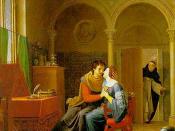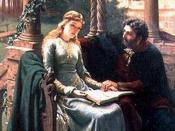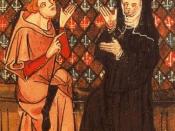Dante Alighieri wrote his Divine Comedy in the beginning of the fourteenth century. In his work, containing over one hundred cantos, Dante illustrates the eternal rewards and punishments for many historical and literary figures. In his highly organized depiction of hell, purgatory, and heaven Dante categorizes sinners and places them where they belong for eternity. Dante, however, did not mention Abelard or Heloise in his entire Divine Comedy. Abelard and Heloise are the famous couple from the twelfth century who had an affair and then committed their lives to the church. Peter Abelard was well-educated, a respected philosopher, and became a prominent theologian. Heloise was also well educated and became a great abbess. If Dante had mentioned Abelard and Heloise he would not have placed them in hell because Abelard repented for his sins and Heloise either did not commit a sin or repented for the one she did commit.
Heloise was the niece of Fulbert, who was in charge of her education. Heloise was quite beautiful as well as intelligent. Abelard heard of her beauty and intelligence and arranged for himself to become her tutor. Once Abelard started living in Fulbert's house with Heloise he "decided she was the one to bring to [his] bed" (66). They secretly became lovers and eventually Heloise got pregnant. Fulbert learned of their affair, and Abelard convinced Heloise to marry him secretly. Fulbert paid one of Abelard's servants to castrate him. Abelard and Heloise were both devastated. Heloise obeyed Abelard's orders and gave her baby to Abelard's sister and joined a convent. Abelard also retreated to another monastery. Later in life, Heloise became a successful Abbess and "all alike admired her piety and wisdom" (97). She is troubled by this view of her because she does not feel she is pious enough. In...


